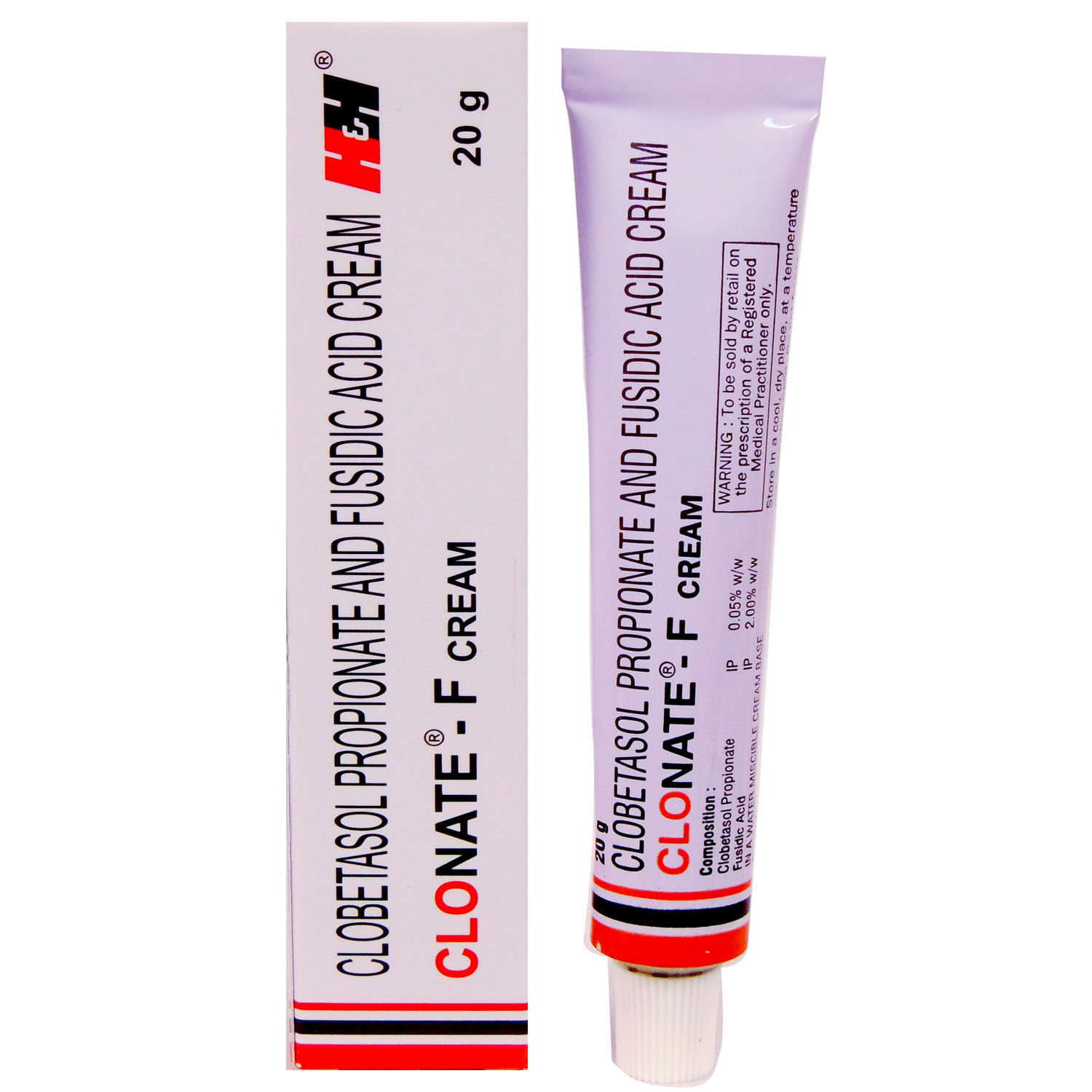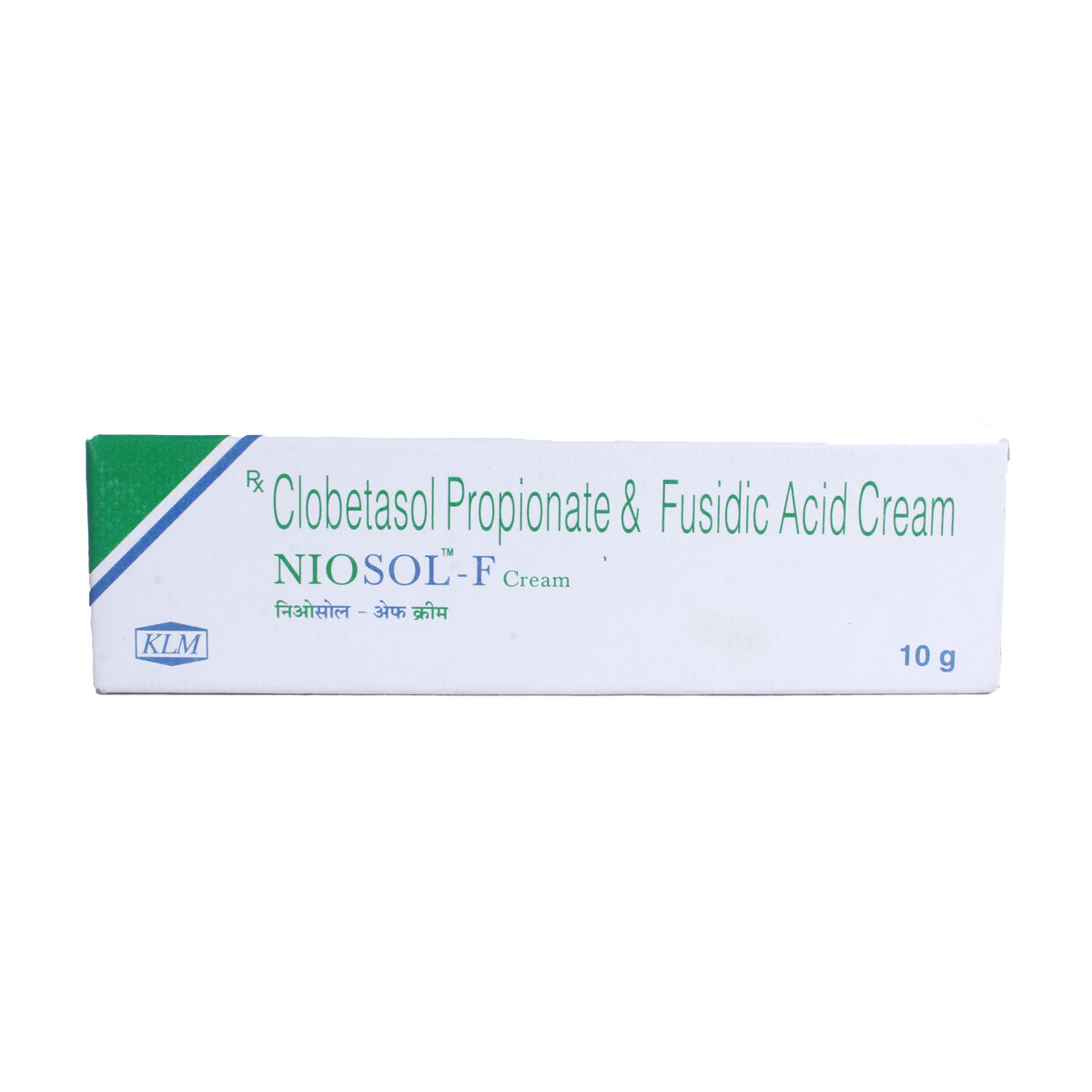Clofusic F Cream
₹404.1*
MRP ₹449
10% off
₹381.65*
MRP ₹449
15% CB
₹67.35 cashback(15%)
Free Delivery
With Circle membership
(Inclusive of all Taxes)
This offer price is valid on orders above ₹800. Apply coupon PHARMA10/PHARMA18 (excluding restricted items)
Know Your Delivery Time
Provide Delivery Location

Whats That

Secure Payment

India's Most Trusted Pharmacy

Genuine Products
Composition :
Manufacturer/Marketer :
Consume Type :
Return Policy :
About Clofusic F Cream
Clofusic F Cream is used to reduce swelling, itching, and redness caused by bacterial skin infections. Bacterial infection is a condition in which harmful bacteria grow in the body and cause infection. It can infect any part of the body and multiply very quickly.
Clofusic F Cream contains Clobetasol (corticosteroids) and Fusidic acid (antibiotic). Clobetasol works by acting inside skin cells and inhibits the release of certain chemical messengers in the body that cause redness, itching, and swelling. When the skin reacts to any allergens, such chemicals are released normally. Fusidic acid is an antibiotic that works by inhibiting the production of essential proteins that are necessary for bacteria to grow, multiply and increase in numbers. Thereby, it stops the growth of bacteria without killing them directly. Then, the bacteria eventually die, or the immune system destroys them and clears the infection.
Clofusic F Cream is only for external use. Take a small amount of Clofusic F Cream on the finger and apply it as a thin layer on the clean and dry affected area. Avoid contact of Clofusic F Cream with nose, ears, mouth, or eyes. In case Clofusic F Cream comes in contact with these areas accidentally, rinse with water thoroughly. Your doctor will advise you on how often you use Clofusic F Cream based on your medical condition. In some cases, you may experience pain, itching, irritation, or burning sensation at the site of application. Most of these side effects of Clofusic F Cream do not require medical attention and gradually resolve over time. However, if the side effects persist or worsen, please consult your doctor.
If you are known to be allergic to Clofusic F Cream or any other medicines, please tell your doctor. Do not wrap or cover the treated area with bandages unless advised by your doctor. Avoid smoking or going near naked flames as the fabric (bedding, clothing, dressings) that is in contact with Clofusic F Cream catches fire and burns easily, which is a serious fire hazard. If you are pregnant or breastfeeding, please inform your doctor before taking Clofusic F Cream. Avoid using Clofusic F Cream for more than 5 days in children and on the face. Do not apply Clofusic F Cream in large amounts or use for a longer time than prescribed as it does not give quick or better results but increases the risk of side effects and makes skin more sensitive to Clofusic F Cream. If you have rosacea (redness and often red, small, pus-filled bumps on the face) or acne, please inform your doctor before taking Clofusic F Cream.
Uses of Clofusic F Cream
Medicinal Benefits
Clofusic F Cream is a combination of two drugs, namely Clobetasol and Fusidic acid. Clofusic F Cream is used to reduce swelling, itching, and redness caused by bacterial skin infections. Clobetasol is a corticosteroid that acts inside skin cells and inhibits the release of certain chemical messengers in the body that cause redness, itching, and swelling. When the skin reacts to any allergens, such chemicals are released normally. Fusidic acid is a narrow-spectrum antibiotic that mainly acts against gram-positive bacteria. It inhibits the production of essential proteins that are necessary for bacteria to grow, multiply and increase in numbers. Thereby, it stops the growth of bacteria without killing them directly. Then, the bacteria eventually die, or the immune system destroys them and clears the infection.
Side Effects of Clofusic F Cream
- Pain
- Itching, irritation or burning sensation at the site of application.
Directions for Use
Storage
Drug Warnings
Do not wrap or cover the treated area with bandages unless advised by your doctor. If you are known to be allergic to Clofusic F Cream or any other medicines, please tell your doctor. Avoid smoking or going near naked flames as the fabric (bedding, clothing, dressings) that is in contact with Clofusic F Cream catches fire and burns easily, which is a serious fire hazard. If you are pregnant or breastfeeding, please inform your doctor before taking Clofusic F Cream. Avoid using Clofusic F Cream for more than 5 days in children and on the face. Do not apply Clofusic F Cream in large amounts or use for a long time than prescribed as it does not give quick or better results but increases the risk of side effects and makes skin more sensitive to Clofusic F Cream. If you have rosacea (redness and often red, small, pus-filled bumps on the face) or acne, please inform your doctor before taking Clofusic F Cream.
Therapeutic Class
Drug-Drug Interactions
Drug-Food Interactions
Diet & Lifestyle Advise
- Eat foods rich in quercetin (a flavonoid) such as apples, cherry, broccoli, spinach and blueberries.
- Consuming food rich in probiotics helps in developing the immune system against allergies.
- Limit intake of food that might trigger allergies such as dairy products, soy, eggs, and nuts.
- Avoid consumption of foods with excess sugar as it may flare-up inflammation.
- Include fruits, vegetables, whole grains, healthy fats and fish in your diet.
- Avoiding getting in contact with harsh soaps, detergents and rough fabrics.
Habit Forming
How Clofusic F Cream Works
What if I have taken an overdose of Clofusic F Cream
Alcohol
Caution
Interaction of Clofusic F Cream with alcohol is unknown. Please consult a doctor before consuming alcohol while using Clofusic F Cream.
Pregnancy
Caution
The safety of Clofusic F Cream in pregnant women is unknown. Therefore, it is given to pregnant women only if the doctor thinks benefits outweigh risks.
Breast Feeding
Caution
Do not apply Clofusic F Cream on the breast area. Clofusic F Cream is given to breastfeeding mothers only if the doctor thinks benefits are greater than risks.
Driving
Safe if prescribed
Clofusic F Cream usually does not affect your ability to drive or operate machinery.
Liver
Caution
If you have any concerns regarding the use of Clofusic F Cream in patients with Liver problems, please consult a doctor.
Kidney
Caution
If you have any concerns regarding the use of Clofusic F Cream in patients with Kidney problems, please consult a doctor.
Children
Caution
Clofusic F Cream should be used with caution in children if prescribed by a doctor.
Country of origin
Author Details
We provide you with authentic, trustworthy and relevant information
FAQs
Disclaimer
Product Substitutes














